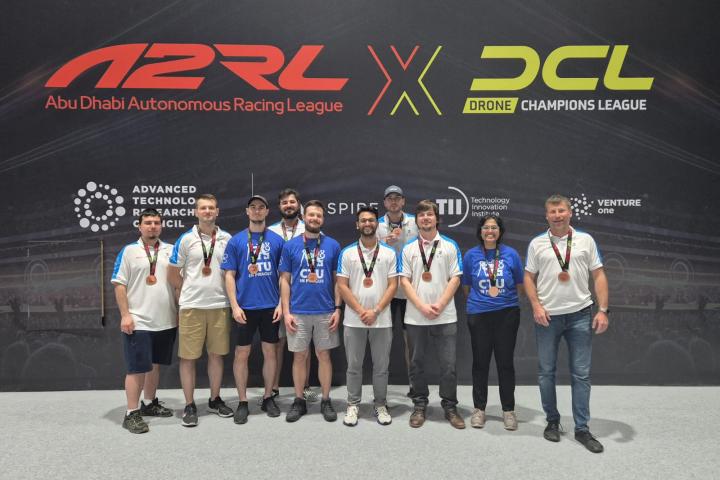
In the quarterfinals and semifinals, the MRS team managed to speed up considerably compared to the previous rounds, steadily covering the course in 40 seconds. In the final round, they tried to get to the front and fly a much faster trajectory. However, this was already beyond the strength of the Czech flying robots, and he did not achieve a medal position. The gold medal was won by the team from TU Delft University, the silver medal by TII, and the bronze medal by the team from KAIST University. The winners will share a total prize of 1 million US dollars in Abu Dhabi. The Czechs will take home more than 50,000 for finishing 4th in the main competition, where they flew on time, and for advancing to the final round of the competition, where four drones flew simultaneously.
Another big challenge was the time slalom discipline between distant gates, in which autonomous drones often struggle with a limited ability to navigate - sensors are often unable to detect obstacles at greater distances. Here, too, the MRS team did not lose out and made it through to the final round. In a competition between robot teams and human pilots, artificial intelligence managed to win, which no one expected. This also shows the very high level of competition in Abu Dhabi.
"This is a great and unexpected result because we have never focused on time trials before. Nevertheless, we were able to compete with the absolute world leaders who specialize in this type of competition," said Assoc. Martin Saska, head of the MRS group, which operates at the Department of Cybernetics of the CTU Faculty of Science. The experience from the top competition, which combined research in AI and robotics with extreme sports, will help scientists from Prague to further improve their agile flying systems. Autonomous multi-robotic systems find applications for example in critical infrastructure inspection, industry, or rescue operations.
The A2RL racing series, whose first edition in the United Arab Emirates was organized by ASPIRE and the Drone Champions League, is one of the most technologically advanced autonomous drone competitions in the world. Here, drones reach speeds of up to 150 km/h and must manoeuvre autonomously in close proximity to obstacles with up to 7 G overloads - all without human intervention and using on-board artificial intelligence and machine learning.
Further MRS research will focus on increasing the speed and reliability of drones
The MRS group's research now focuses on increasing the speed and reliability of swarm flying, the ability to move autonomously over long distances and the miniaturisation of sensors. These goals are key for applications in rescue operations, large-scale facility inspections and other scenarios where traditional systems fail.
The group of roboticists from the Faculty of Electrical Engineering of CTU will be based on a new robotic system RoboFly, which consists of a small flying robot with cameras and reliable communication without GPS. "This is already a commercial product that we are selling in cooperation with Fly4Future, and its main goal is to offer the industry reliable swarm systems with minimal infrastructure needs," said Martin Saska.
After returning from the United Arab Emirates, MRS will test the new technology at the FEL CTU training centre in Temesvár in practical demonstrations of more than thirty drones working together in a real environment, including systems capable of operating without GPS, thanks to a combination of cameras and wireless distance measurement. The presentation of cutting-edge technologies for autonomous swarm control, GPS-free camera localization, and advanced trajectory planning aims to verify not only the technological maturity of the research team but also their readiness to transfer research results into practice.
More information about the competition can be found at www.a2rl.io.
Photos and videos from the preparation of the MRS/Fly4Future team and the competition itself.
Photo credit: MRS CTU